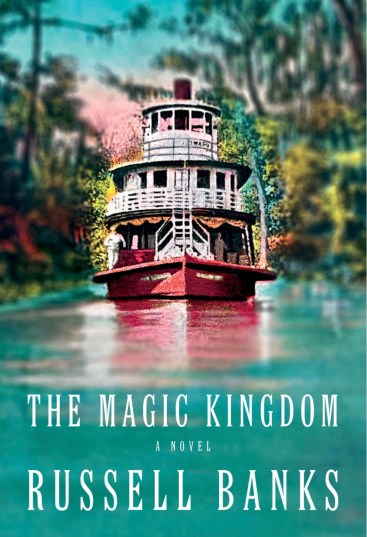Review | ‘The Magic Kingdom’ by Russell Banks
A Tragic Story Carved From the Swamps, Creeks, and Sawgrass of the Everglades

The year is 1971. The place is Florida, south of Orlando, and 81-year-old Harley Mann sits on the porch of the house he has lived alone in for half a century speaking into a reel-to-reel tape recorder. Mann has never been married or fathered any children. His siblings are long gone. He has no close friends. He’s as alone as he has been for decades.
A solitary man but not necessarily a lonely one, Mann has a story he needs to tell of a particular place and time that exists now only in his memory — and in an obsessively rendered plaster of Paris diorama that sits on sawhorses in his dining room. Like an archeologist on a dig, he’s unearthing memories he’s avoided thinking about for most of his long life. At its essence, Mann recounts a tragic tale of lost innocence and forbidden love set in a utopia carved from the swamps, creeks, and sawgrass of the Everglades. Mann doesn’t know what will become of the tapes he’s making, if they will be found and discarded or transcribed and possibly donated to a local historical society.
I can’t remember when I discovered Russell Banks (who sadly died of cancer on January 7, 2023), or which of his books I read first. But over the past 20 years, I’ve read Continental Drift, Trailerpark, Affliction, Rule of the Bone, and Lost Memory of Skin. Banks is one of my favorite authors and his books have a special place on my shelves, not only because the tales are compelling, but also because they bear re-reading. America is Banks’s primary canvas and many of his characters come from the working class or the shabby margins of society, and are often misfits and outcasts. I was eager to read The Magic Kingdom and wasn’t disappointed — it never takes Banks long to hook me and pull me into his fictional world.
The United States had its share of utopian societies in the 19th and early 20th century, including the Mormons and the Shakers. Most were agrarian, self-contained, communal in organization, often founded on religious or spiritual beliefs and practices. Harley Mann’s parents believed in the anti-capitalist teachings of the philosopher John Ruskin, and in 1901 the Manns followed the Ruskinites from Indiana to southeast Georgia and lived in “communitarian squalor” until Harley’s father died of typhus. This put the family in desperate straits until they hooked up with Shakers who were building a community called New Bethany in the Okefenokee Swamp in Florida. Because celibacy was one of their core tenets, the Shakers were always in need of fresh recruits. Harley was 12 years old.
Though he will become skeptical of some Shaker beliefs, the habits of purposeful work and simplicity suit Harley so well that he adheres to them the rest of his days. The band of Shakers building New Bethany is small, but industrious and ingenious, sober and practical. Along with his mother and siblings, young Harley — now Brother Harley — adapts to the ways of the Shakers and learns a number of skills.
“There was almost no variety among them in how they lived their daily lives,” Harley recounts, “for everyone’s days and nights were as rigidly scheduled and timed and strictly choreographed as a marching band’s.”
Despite the strict routines and religious intensity, life at New Bethany borders on the idyllic — 7,000 acres of paradise separate and apart from the rest of the world. It is a self-sustaining community of order and predictability and rules and faith, until Harley meets Sadie Pratt, a consumptive patient seven years his senior who is being treated nearby. Sadie visits New Bethany from time to time and Harley develops an obsession with her that alters the course of his life and ultimately leads to the dissolution of New Bethany.
Although this is a tragedy in that Harley’s actions bring about the destruction of the community he deeply loves, it’s rendered with Banks’s customary, almost effortless, command of pace and tone and human predicaments.
Harley’s never able to move on, to find love again or secure a place where he feels the same sense of belonging. After making a fortune speculating in real estate, Harley buys up, parcel by parcel, all 7,000 acres of the New Bethany property. He frequently visits the ruins of the site but never seriously tries to re-create its former splendor. Instead he lets nature reclaim it and constructs his plaster-of-Paris diorama. Is this an act of love or madness? Or both?
New Bethany was Harley Mann’s Magic Kingdom. In a final ironic twist, he’s deceived into selling all 7,000 acres to a corporation that will build a Magic Kingdom of an entirely different sort.
This review originally appeared in the California Review of Books.




You must be logged in to post a comment.